Impact of Covid-19 on Unilever's Supplier Selection and Procurement
VerifiedAdded on 2023/06/10
|12
|3828
|209
Report
AI Summary
This report provides an in-depth analysis of Unilever's sustainable procurement practices. It begins by outlining supplier evaluation criteria, emphasizing the importance of production capacity, quality, performance, risk management, pricing, and economic conditions. The report then examines the impact of the COVID-19 pandemic on Unilever's supplier selection process, highlighting challenges in supply chain management, staff shortages, and the rise of new technologies like the Internet of Things (IoT) and Big Data to improve traceability, stock management, and overall supply chain efficiency. Furthermore, the report explores how stakeholder relationships and institutional pressures influence supplier selection and corporate reputation, offering a comprehensive view of sustainable procurement in a global business context.
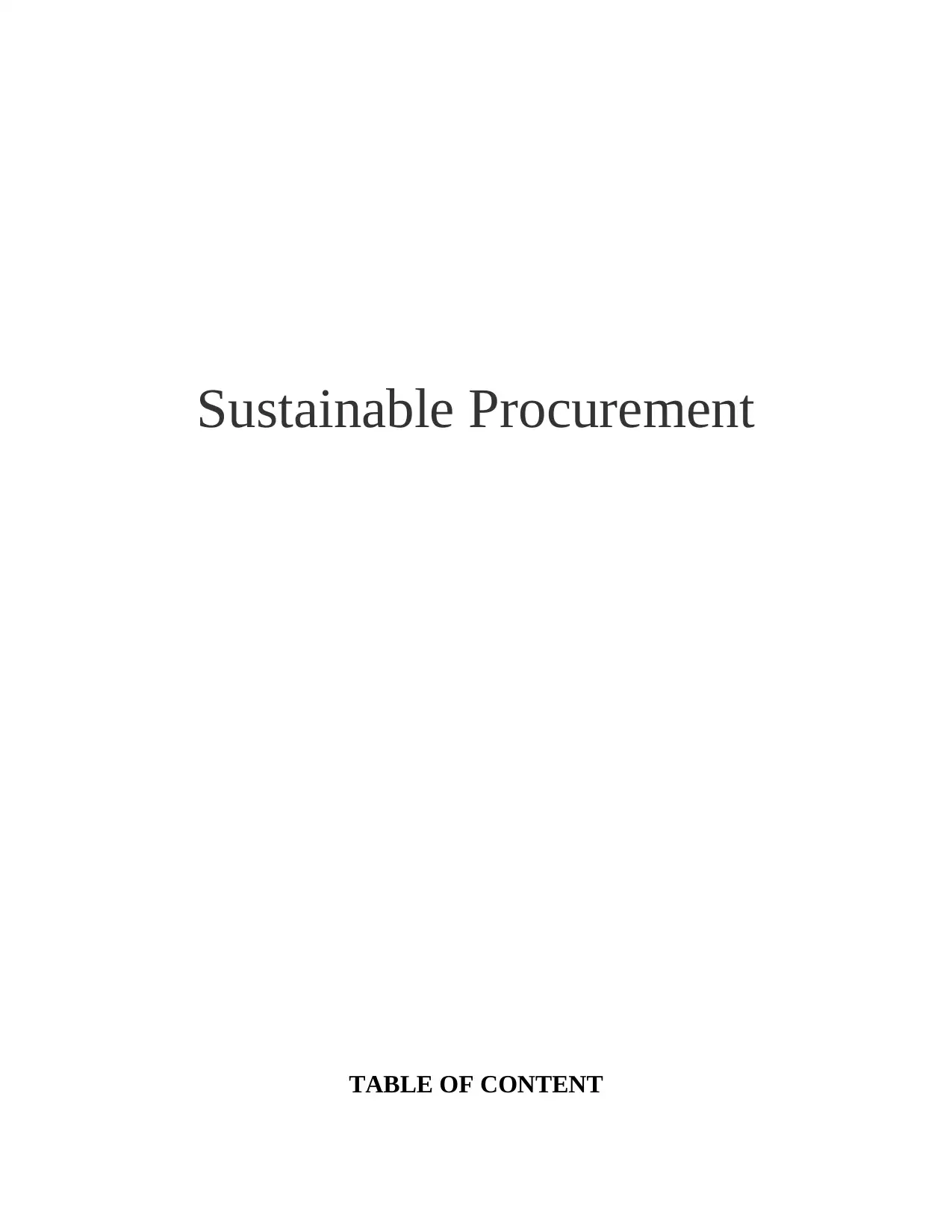
Sustainable Procurement
TABLE OF CONTENT
TABLE OF CONTENT
Paraphrase This Document
Need a fresh take? Get an instant paraphrase of this document with our AI Paraphraser
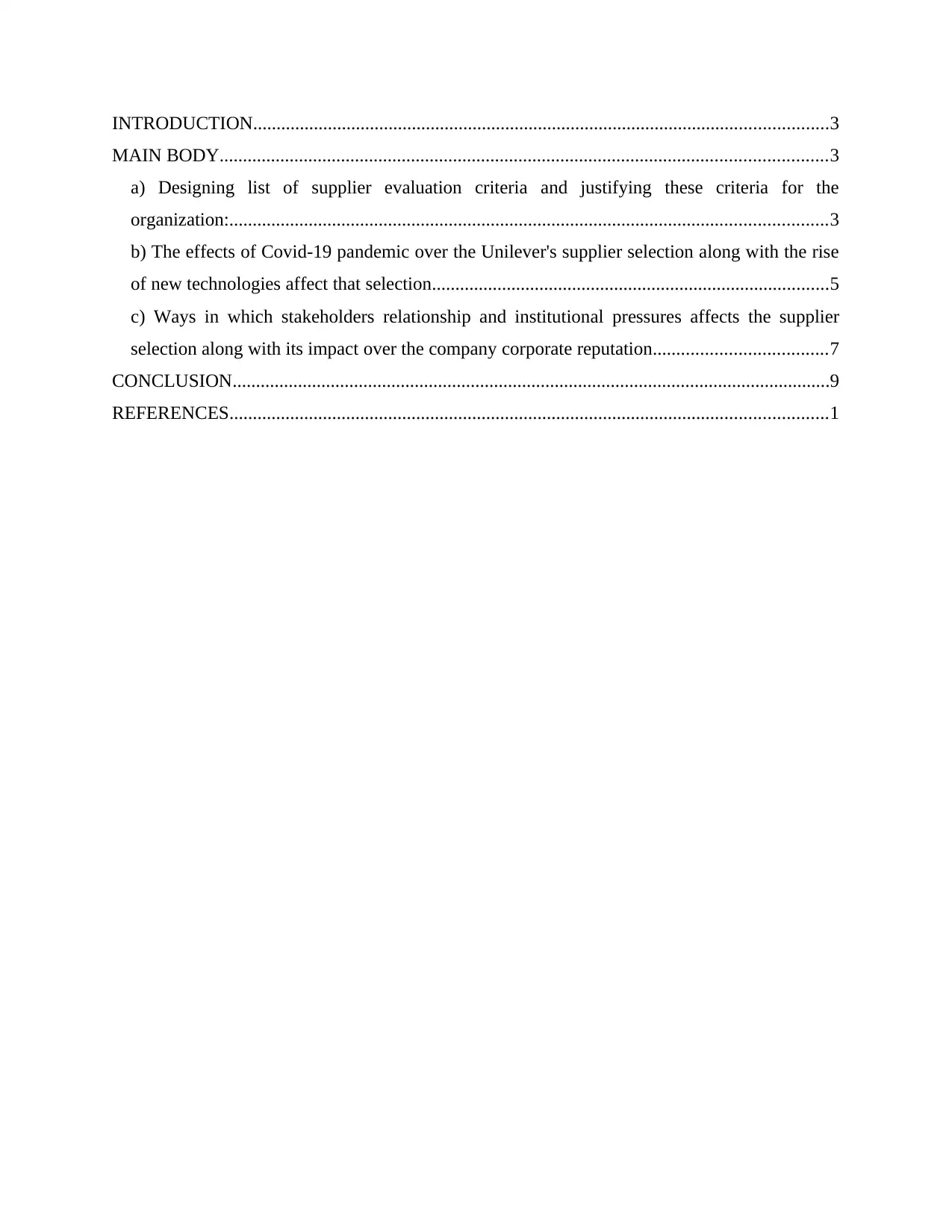
INTRODUCTION...........................................................................................................................3
MAIN BODY..................................................................................................................................3
a) Designing list of supplier evaluation criteria and justifying these criteria for the
organization:................................................................................................................................3
b) The effects of Covid-19 pandemic over the Unilever's supplier selection along with the rise
of new technologies affect that selection.....................................................................................5
c) Ways in which stakeholders relationship and institutional pressures affects the supplier
selection along with its impact over the company corporate reputation.....................................7
CONCLUSION................................................................................................................................9
REFERENCES................................................................................................................................1
MAIN BODY..................................................................................................................................3
a) Designing list of supplier evaluation criteria and justifying these criteria for the
organization:................................................................................................................................3
b) The effects of Covid-19 pandemic over the Unilever's supplier selection along with the rise
of new technologies affect that selection.....................................................................................5
c) Ways in which stakeholders relationship and institutional pressures affects the supplier
selection along with its impact over the company corporate reputation.....................................7
CONCLUSION................................................................................................................................9
REFERENCES................................................................................................................................1
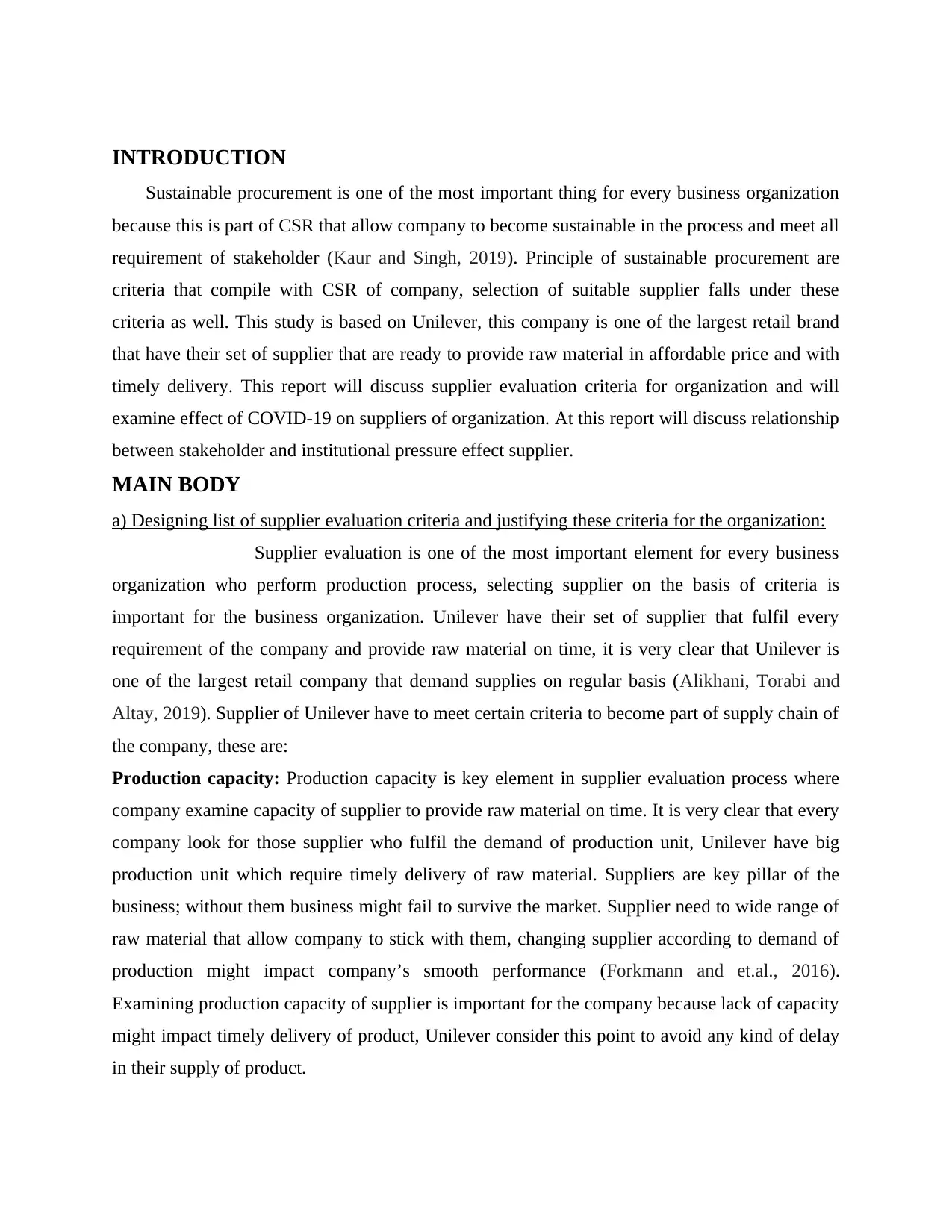
INTRODUCTION
Sustainable procurement is one of the most important thing for every business organization
because this is part of CSR that allow company to become sustainable in the process and meet all
requirement of stakeholder (Kaur and Singh, 2019). Principle of sustainable procurement are
criteria that compile with CSR of company, selection of suitable supplier falls under these
criteria as well. This study is based on Unilever, this company is one of the largest retail brand
that have their set of supplier that are ready to provide raw material in affordable price and with
timely delivery. This report will discuss supplier evaluation criteria for organization and will
examine effect of COVID-19 on suppliers of organization. At this report will discuss relationship
between stakeholder and institutional pressure effect supplier.
MAIN BODY
a) Designing list of supplier evaluation criteria and justifying these criteria for the organization:
Supplier evaluation is one of the most important element for every business
organization who perform production process, selecting supplier on the basis of criteria is
important for the business organization. Unilever have their set of supplier that fulfil every
requirement of the company and provide raw material on time, it is very clear that Unilever is
one of the largest retail company that demand supplies on regular basis (Alikhani, Torabi and
Altay, 2019). Supplier of Unilever have to meet certain criteria to become part of supply chain of
the company, these are:
Production capacity: Production capacity is key element in supplier evaluation process where
company examine capacity of supplier to provide raw material on time. It is very clear that every
company look for those supplier who fulfil the demand of production unit, Unilever have big
production unit which require timely delivery of raw material. Suppliers are key pillar of the
business; without them business might fail to survive the market. Supplier need to wide range of
raw material that allow company to stick with them, changing supplier according to demand of
production might impact company’s smooth performance (Forkmann and et.al., 2016).
Examining production capacity of supplier is important for the company because lack of capacity
might impact timely delivery of product, Unilever consider this point to avoid any kind of delay
in their supply of product.
Sustainable procurement is one of the most important thing for every business organization
because this is part of CSR that allow company to become sustainable in the process and meet all
requirement of stakeholder (Kaur and Singh, 2019). Principle of sustainable procurement are
criteria that compile with CSR of company, selection of suitable supplier falls under these
criteria as well. This study is based on Unilever, this company is one of the largest retail brand
that have their set of supplier that are ready to provide raw material in affordable price and with
timely delivery. This report will discuss supplier evaluation criteria for organization and will
examine effect of COVID-19 on suppliers of organization. At this report will discuss relationship
between stakeholder and institutional pressure effect supplier.
MAIN BODY
a) Designing list of supplier evaluation criteria and justifying these criteria for the organization:
Supplier evaluation is one of the most important element for every business
organization who perform production process, selecting supplier on the basis of criteria is
important for the business organization. Unilever have their set of supplier that fulfil every
requirement of the company and provide raw material on time, it is very clear that Unilever is
one of the largest retail company that demand supplies on regular basis (Alikhani, Torabi and
Altay, 2019). Supplier of Unilever have to meet certain criteria to become part of supply chain of
the company, these are:
Production capacity: Production capacity is key element in supplier evaluation process where
company examine capacity of supplier to provide raw material on time. It is very clear that every
company look for those supplier who fulfil the demand of production unit, Unilever have big
production unit which require timely delivery of raw material. Suppliers are key pillar of the
business; without them business might fail to survive the market. Supplier need to wide range of
raw material that allow company to stick with them, changing supplier according to demand of
production might impact company’s smooth performance (Forkmann and et.al., 2016).
Examining production capacity of supplier is important for the company because lack of capacity
might impact timely delivery of product, Unilever consider this point to avoid any kind of delay
in their supply of product.
⊘ This is a preview!⊘
Do you want full access?
Subscribe today to unlock all pages.

Trusted by 1+ million students worldwide
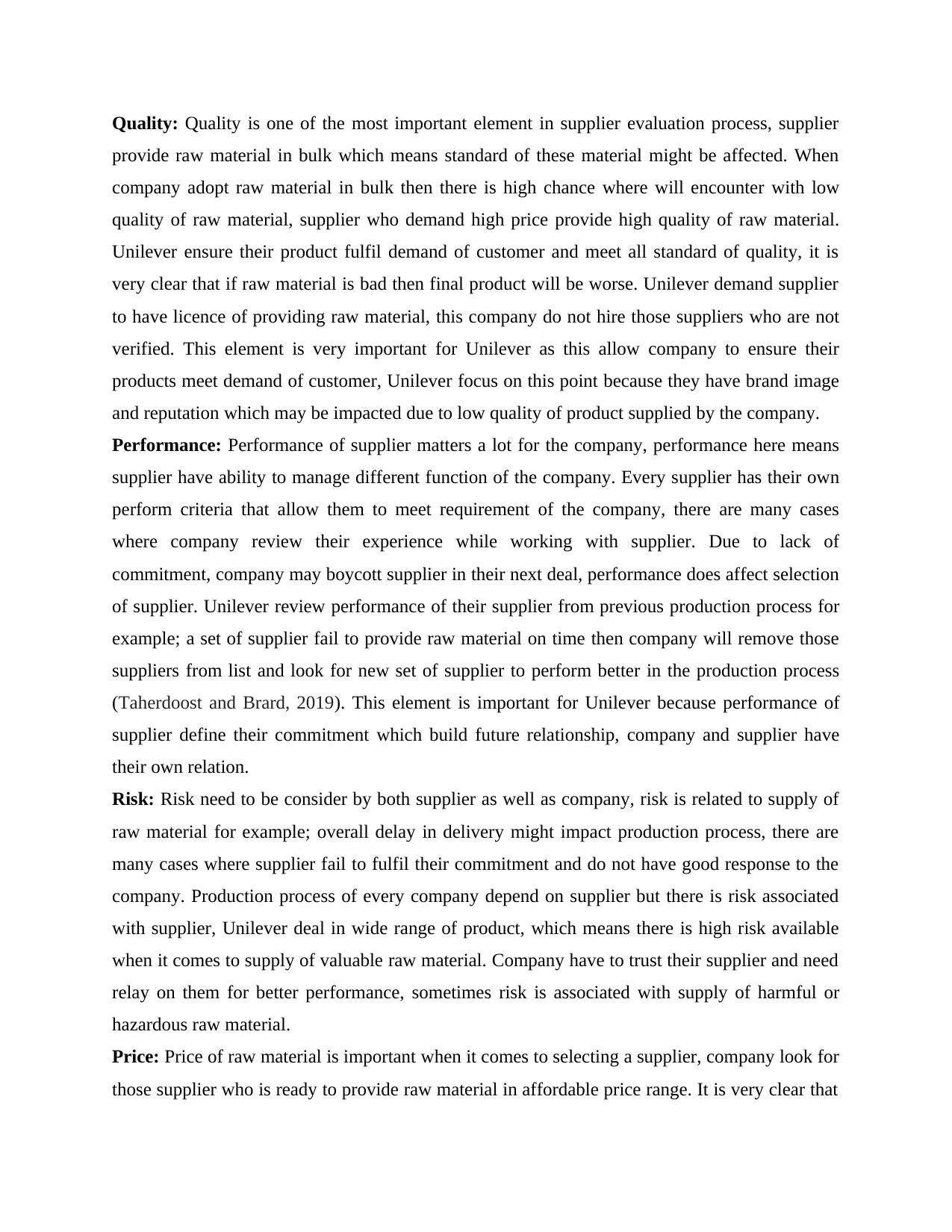
Quality: Quality is one of the most important element in supplier evaluation process, supplier
provide raw material in bulk which means standard of these material might be affected. When
company adopt raw material in bulk then there is high chance where will encounter with low
quality of raw material, supplier who demand high price provide high quality of raw material.
Unilever ensure their product fulfil demand of customer and meet all standard of quality, it is
very clear that if raw material is bad then final product will be worse. Unilever demand supplier
to have licence of providing raw material, this company do not hire those suppliers who are not
verified. This element is very important for Unilever as this allow company to ensure their
products meet demand of customer, Unilever focus on this point because they have brand image
and reputation which may be impacted due to low quality of product supplied by the company.
Performance: Performance of supplier matters a lot for the company, performance here means
supplier have ability to manage different function of the company. Every supplier has their own
perform criteria that allow them to meet requirement of the company, there are many cases
where company review their experience while working with supplier. Due to lack of
commitment, company may boycott supplier in their next deal, performance does affect selection
of supplier. Unilever review performance of their supplier from previous production process for
example; a set of supplier fail to provide raw material on time then company will remove those
suppliers from list and look for new set of supplier to perform better in the production process
(Taherdoost and Brard, 2019). This element is important for Unilever because performance of
supplier define their commitment which build future relationship, company and supplier have
their own relation.
Risk: Risk need to be consider by both supplier as well as company, risk is related to supply of
raw material for example; overall delay in delivery might impact production process, there are
many cases where supplier fail to fulfil their commitment and do not have good response to the
company. Production process of every company depend on supplier but there is risk associated
with supplier, Unilever deal in wide range of product, which means there is high risk available
when it comes to supply of valuable raw material. Company have to trust their supplier and need
relay on them for better performance, sometimes risk is associated with supply of harmful or
hazardous raw material.
Price: Price of raw material is important when it comes to selecting a supplier, company look for
those supplier who is ready to provide raw material in affordable price range. It is very clear that
provide raw material in bulk which means standard of these material might be affected. When
company adopt raw material in bulk then there is high chance where will encounter with low
quality of raw material, supplier who demand high price provide high quality of raw material.
Unilever ensure their product fulfil demand of customer and meet all standard of quality, it is
very clear that if raw material is bad then final product will be worse. Unilever demand supplier
to have licence of providing raw material, this company do not hire those suppliers who are not
verified. This element is very important for Unilever as this allow company to ensure their
products meet demand of customer, Unilever focus on this point because they have brand image
and reputation which may be impacted due to low quality of product supplied by the company.
Performance: Performance of supplier matters a lot for the company, performance here means
supplier have ability to manage different function of the company. Every supplier has their own
perform criteria that allow them to meet requirement of the company, there are many cases
where company review their experience while working with supplier. Due to lack of
commitment, company may boycott supplier in their next deal, performance does affect selection
of supplier. Unilever review performance of their supplier from previous production process for
example; a set of supplier fail to provide raw material on time then company will remove those
suppliers from list and look for new set of supplier to perform better in the production process
(Taherdoost and Brard, 2019). This element is important for Unilever because performance of
supplier define their commitment which build future relationship, company and supplier have
their own relation.
Risk: Risk need to be consider by both supplier as well as company, risk is related to supply of
raw material for example; overall delay in delivery might impact production process, there are
many cases where supplier fail to fulfil their commitment and do not have good response to the
company. Production process of every company depend on supplier but there is risk associated
with supplier, Unilever deal in wide range of product, which means there is high risk available
when it comes to supply of valuable raw material. Company have to trust their supplier and need
relay on them for better performance, sometimes risk is associated with supply of harmful or
hazardous raw material.
Price: Price of raw material is important when it comes to selecting a supplier, company look for
those supplier who is ready to provide raw material in affordable price range. It is very clear that
Paraphrase This Document
Need a fresh take? Get an instant paraphrase of this document with our AI Paraphraser
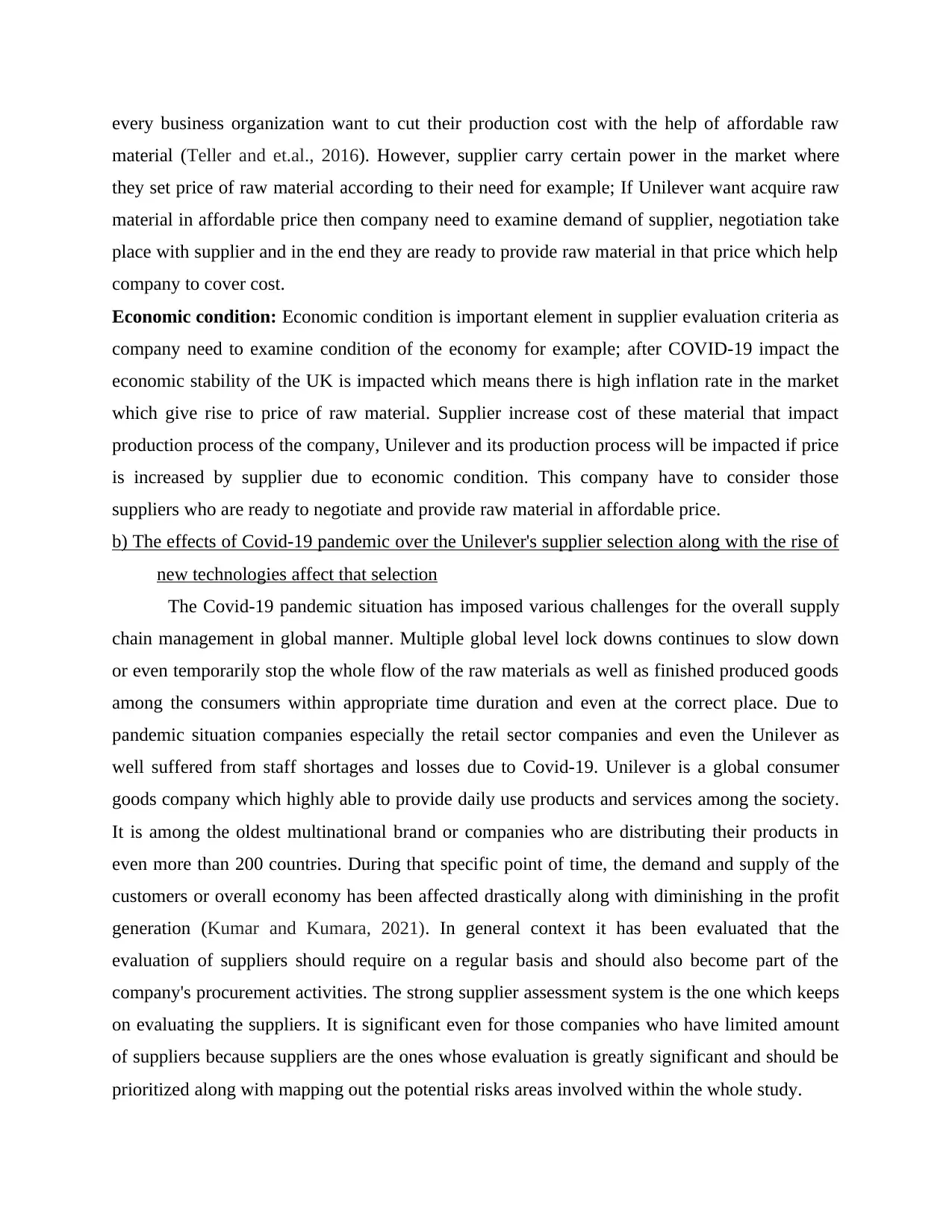
every business organization want to cut their production cost with the help of affordable raw
material (Teller and et.al., 2016). However, supplier carry certain power in the market where
they set price of raw material according to their need for example; If Unilever want acquire raw
material in affordable price then company need to examine demand of supplier, negotiation take
place with supplier and in the end they are ready to provide raw material in that price which help
company to cover cost.
Economic condition: Economic condition is important element in supplier evaluation criteria as
company need to examine condition of the economy for example; after COVID-19 impact the
economic stability of the UK is impacted which means there is high inflation rate in the market
which give rise to price of raw material. Supplier increase cost of these material that impact
production process of the company, Unilever and its production process will be impacted if price
is increased by supplier due to economic condition. This company have to consider those
suppliers who are ready to negotiate and provide raw material in affordable price.
b) The effects of Covid-19 pandemic over the Unilever's supplier selection along with the rise of
new technologies affect that selection
The Covid-19 pandemic situation has imposed various challenges for the overall supply
chain management in global manner. Multiple global level lock downs continues to slow down
or even temporarily stop the whole flow of the raw materials as well as finished produced goods
among the consumers within appropriate time duration and even at the correct place. Due to
pandemic situation companies especially the retail sector companies and even the Unilever as
well suffered from staff shortages and losses due to Covid-19. Unilever is a global consumer
goods company which highly able to provide daily use products and services among the society.
It is among the oldest multinational brand or companies who are distributing their products in
even more than 200 countries. During that specific point of time, the demand and supply of the
customers or overall economy has been affected drastically along with diminishing in the profit
generation (Kumar and Kumara, 2021). In general context it has been evaluated that the
evaluation of suppliers should require on a regular basis and should also become part of the
company's procurement activities. The strong supplier assessment system is the one which keeps
on evaluating the suppliers. It is significant even for those companies who have limited amount
of suppliers because suppliers are the ones whose evaluation is greatly significant and should be
prioritized along with mapping out the potential risks areas involved within the whole study.
material (Teller and et.al., 2016). However, supplier carry certain power in the market where
they set price of raw material according to their need for example; If Unilever want acquire raw
material in affordable price then company need to examine demand of supplier, negotiation take
place with supplier and in the end they are ready to provide raw material in that price which help
company to cover cost.
Economic condition: Economic condition is important element in supplier evaluation criteria as
company need to examine condition of the economy for example; after COVID-19 impact the
economic stability of the UK is impacted which means there is high inflation rate in the market
which give rise to price of raw material. Supplier increase cost of these material that impact
production process of the company, Unilever and its production process will be impacted if price
is increased by supplier due to economic condition. This company have to consider those
suppliers who are ready to negotiate and provide raw material in affordable price.
b) The effects of Covid-19 pandemic over the Unilever's supplier selection along with the rise of
new technologies affect that selection
The Covid-19 pandemic situation has imposed various challenges for the overall supply
chain management in global manner. Multiple global level lock downs continues to slow down
or even temporarily stop the whole flow of the raw materials as well as finished produced goods
among the consumers within appropriate time duration and even at the correct place. Due to
pandemic situation companies especially the retail sector companies and even the Unilever as
well suffered from staff shortages and losses due to Covid-19. Unilever is a global consumer
goods company which highly able to provide daily use products and services among the society.
It is among the oldest multinational brand or companies who are distributing their products in
even more than 200 countries. During that specific point of time, the demand and supply of the
customers or overall economy has been affected drastically along with diminishing in the profit
generation (Kumar and Kumara, 2021). In general context it has been evaluated that the
evaluation of suppliers should require on a regular basis and should also become part of the
company's procurement activities. The strong supplier assessment system is the one which keeps
on evaluating the suppliers. It is significant even for those companies who have limited amount
of suppliers because suppliers are the ones whose evaluation is greatly significant and should be
prioritized along with mapping out the potential risks areas involved within the whole study.
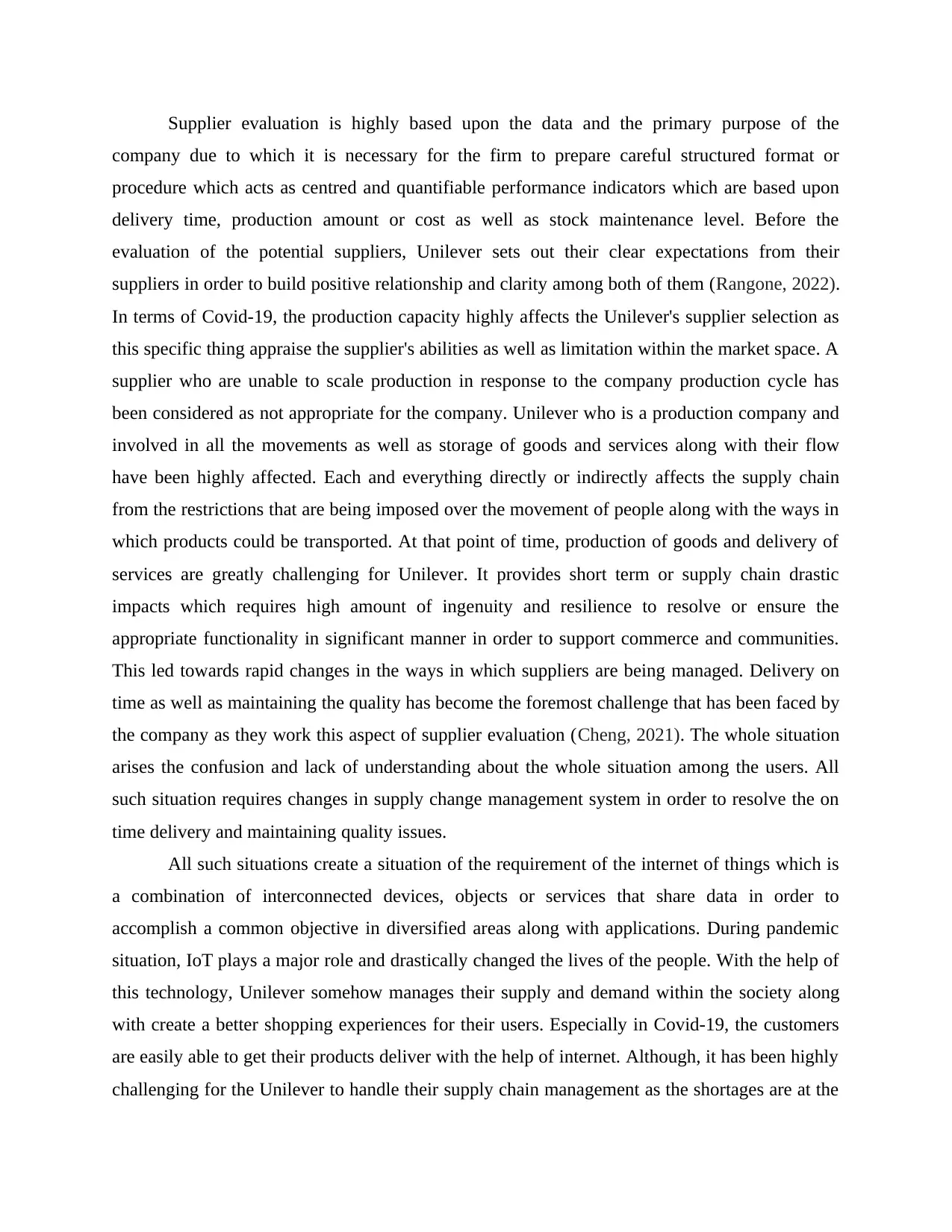
Supplier evaluation is highly based upon the data and the primary purpose of the
company due to which it is necessary for the firm to prepare careful structured format or
procedure which acts as centred and quantifiable performance indicators which are based upon
delivery time, production amount or cost as well as stock maintenance level. Before the
evaluation of the potential suppliers, Unilever sets out their clear expectations from their
suppliers in order to build positive relationship and clarity among both of them (Rangone, 2022).
In terms of Covid-19, the production capacity highly affects the Unilever's supplier selection as
this specific thing appraise the supplier's abilities as well as limitation within the market space. A
supplier who are unable to scale production in response to the company production cycle has
been considered as not appropriate for the company. Unilever who is a production company and
involved in all the movements as well as storage of goods and services along with their flow
have been highly affected. Each and everything directly or indirectly affects the supply chain
from the restrictions that are being imposed over the movement of people along with the ways in
which products could be transported. At that point of time, production of goods and delivery of
services are greatly challenging for Unilever. It provides short term or supply chain drastic
impacts which requires high amount of ingenuity and resilience to resolve or ensure the
appropriate functionality in significant manner in order to support commerce and communities.
This led towards rapid changes in the ways in which suppliers are being managed. Delivery on
time as well as maintaining the quality has become the foremost challenge that has been faced by
the company as they work this aspect of supplier evaluation (Cheng, 2021). The whole situation
arises the confusion and lack of understanding about the whole situation among the users. All
such situation requires changes in supply change management system in order to resolve the on
time delivery and maintaining quality issues.
All such situations create a situation of the requirement of the internet of things which is
a combination of interconnected devices, objects or services that share data in order to
accomplish a common objective in diversified areas along with applications. During pandemic
situation, IoT plays a major role and drastically changed the lives of the people. With the help of
this technology, Unilever somehow manages their supply and demand within the society along
with create a better shopping experiences for their users. Especially in Covid-19, the customers
are easily able to get their products deliver with the help of internet. Although, it has been highly
challenging for the Unilever to handle their supply chain management as the shortages are at the
company due to which it is necessary for the firm to prepare careful structured format or
procedure which acts as centred and quantifiable performance indicators which are based upon
delivery time, production amount or cost as well as stock maintenance level. Before the
evaluation of the potential suppliers, Unilever sets out their clear expectations from their
suppliers in order to build positive relationship and clarity among both of them (Rangone, 2022).
In terms of Covid-19, the production capacity highly affects the Unilever's supplier selection as
this specific thing appraise the supplier's abilities as well as limitation within the market space. A
supplier who are unable to scale production in response to the company production cycle has
been considered as not appropriate for the company. Unilever who is a production company and
involved in all the movements as well as storage of goods and services along with their flow
have been highly affected. Each and everything directly or indirectly affects the supply chain
from the restrictions that are being imposed over the movement of people along with the ways in
which products could be transported. At that point of time, production of goods and delivery of
services are greatly challenging for Unilever. It provides short term or supply chain drastic
impacts which requires high amount of ingenuity and resilience to resolve or ensure the
appropriate functionality in significant manner in order to support commerce and communities.
This led towards rapid changes in the ways in which suppliers are being managed. Delivery on
time as well as maintaining the quality has become the foremost challenge that has been faced by
the company as they work this aspect of supplier evaluation (Cheng, 2021). The whole situation
arises the confusion and lack of understanding about the whole situation among the users. All
such situation requires changes in supply change management system in order to resolve the on
time delivery and maintaining quality issues.
All such situations create a situation of the requirement of the internet of things which is
a combination of interconnected devices, objects or services that share data in order to
accomplish a common objective in diversified areas along with applications. During pandemic
situation, IoT plays a major role and drastically changed the lives of the people. With the help of
this technology, Unilever somehow manages their supply and demand within the society along
with create a better shopping experiences for their users. Especially in Covid-19, the customers
are easily able to get their products deliver with the help of internet. Although, it has been highly
challenging for the Unilever to handle their supply chain management as the shortages are at the
⊘ This is a preview!⊘
Do you want full access?
Subscribe today to unlock all pages.

Trusted by 1+ million students worldwide

end of the suppliers. With the help of this IoT technology the Unilever is able to improve
traceability along with visibility n the stock management along with their whole delivery system.
It also assists in building great relationship among the manufacturer as well as consumers
(Barone and et.al., 2021). The internet of things devices helps in ensuring the security and
integrity of Unilever which highly requires great level of monitoring on regular basis. In order to
manage the supply and demand supplier evaluation criteria, the company adopts IoT in
monitoring store capacity along with remotely management of warehouse helps them to
appropriately deal with their suppliers and even find innovative and advanced ways to produce
goods and services through alternative modes which enhances the capability of the company on
complete manner. All such actions assist the Unilever in order to deal with drastic conditions of
Covid-19 into considerable manner and also help to sustain in such conditions. Furthermore, Big
data also affects the supply chain management by promoting operational excellence, consumer
satisfaction, cost savings, reduction in communication gaps, provide appropriate visibility along
with limit down the gaps between demand and supply chain management system enables the
Unilever to handle and deal with all the issues related to supplier evaluation which is based
highly over the demand and quality aspects in context of the company.
c) Ways in which stakeholders relationship and institutional pressures affects the supplier
selection along with its impact over the company corporate reputation
Stakeholders relationship as well as institutional pressures is an important topic or aspect
in order to incorporate sustainability. The stakeholders power basically refers to the power and
ability of stakeholders in order to affect the organizational decisions. They are the ones who can
be affected by company actions, policies and even from objectives as well. The creditors,
employees, directors, etc. are the major stakeholders from which any company draws their
resources. Stakeholders in context of supply chain management are the ones who formed a broad
and more completed group from the suppliers of services and materials along with delivery as
well as logistics (Govindan and et.al., 2020). According to the recent scenario, it has been
evaluated that immense competition from domestic to global create a situation who highly
grabbed the attention of industries towards the adoption of appropriate supplier evaluation
criteria initiatives to fill the cost gaps as well as upwards and downwards of producer as well as
consumers.
traceability along with visibility n the stock management along with their whole delivery system.
It also assists in building great relationship among the manufacturer as well as consumers
(Barone and et.al., 2021). The internet of things devices helps in ensuring the security and
integrity of Unilever which highly requires great level of monitoring on regular basis. In order to
manage the supply and demand supplier evaluation criteria, the company adopts IoT in
monitoring store capacity along with remotely management of warehouse helps them to
appropriately deal with their suppliers and even find innovative and advanced ways to produce
goods and services through alternative modes which enhances the capability of the company on
complete manner. All such actions assist the Unilever in order to deal with drastic conditions of
Covid-19 into considerable manner and also help to sustain in such conditions. Furthermore, Big
data also affects the supply chain management by promoting operational excellence, consumer
satisfaction, cost savings, reduction in communication gaps, provide appropriate visibility along
with limit down the gaps between demand and supply chain management system enables the
Unilever to handle and deal with all the issues related to supplier evaluation which is based
highly over the demand and quality aspects in context of the company.
c) Ways in which stakeholders relationship and institutional pressures affects the supplier
selection along with its impact over the company corporate reputation
Stakeholders relationship as well as institutional pressures is an important topic or aspect
in order to incorporate sustainability. The stakeholders power basically refers to the power and
ability of stakeholders in order to affect the organizational decisions. They are the ones who can
be affected by company actions, policies and even from objectives as well. The creditors,
employees, directors, etc. are the major stakeholders from which any company draws their
resources. Stakeholders in context of supply chain management are the ones who formed a broad
and more completed group from the suppliers of services and materials along with delivery as
well as logistics (Govindan and et.al., 2020). According to the recent scenario, it has been
evaluated that immense competition from domestic to global create a situation who highly
grabbed the attention of industries towards the adoption of appropriate supplier evaluation
criteria initiatives to fill the cost gaps as well as upwards and downwards of producer as well as
consumers.
Paraphrase This Document
Need a fresh take? Get an instant paraphrase of this document with our AI Paraphraser
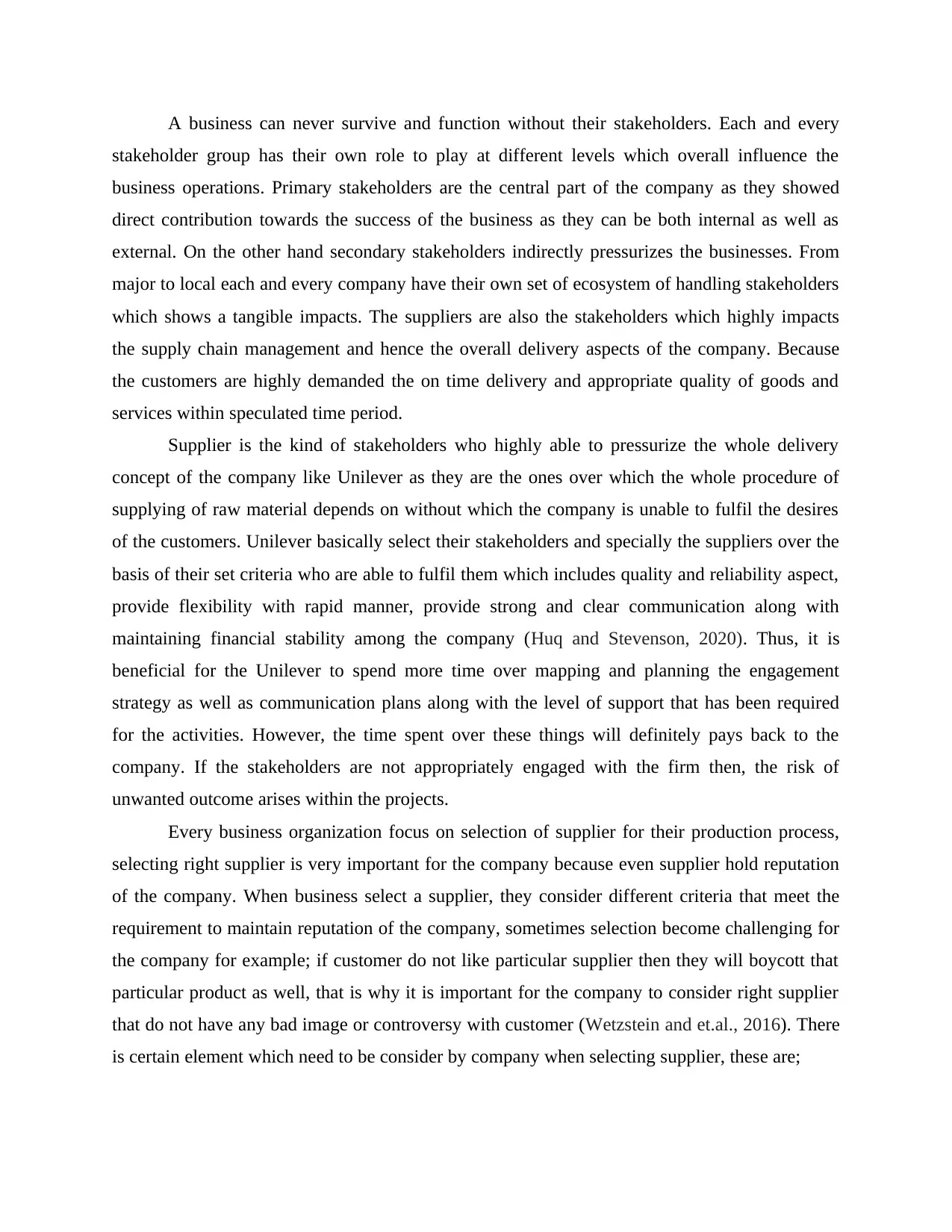
A business can never survive and function without their stakeholders. Each and every
stakeholder group has their own role to play at different levels which overall influence the
business operations. Primary stakeholders are the central part of the company as they showed
direct contribution towards the success of the business as they can be both internal as well as
external. On the other hand secondary stakeholders indirectly pressurizes the businesses. From
major to local each and every company have their own set of ecosystem of handling stakeholders
which shows a tangible impacts. The suppliers are also the stakeholders which highly impacts
the supply chain management and hence the overall delivery aspects of the company. Because
the customers are highly demanded the on time delivery and appropriate quality of goods and
services within speculated time period.
Supplier is the kind of stakeholders who highly able to pressurize the whole delivery
concept of the company like Unilever as they are the ones over which the whole procedure of
supplying of raw material depends on without which the company is unable to fulfil the desires
of the customers. Unilever basically select their stakeholders and specially the suppliers over the
basis of their set criteria who are able to fulfil them which includes quality and reliability aspect,
provide flexibility with rapid manner, provide strong and clear communication along with
maintaining financial stability among the company (Huq and Stevenson, 2020). Thus, it is
beneficial for the Unilever to spend more time over mapping and planning the engagement
strategy as well as communication plans along with the level of support that has been required
for the activities. However, the time spent over these things will definitely pays back to the
company. If the stakeholders are not appropriately engaged with the firm then, the risk of
unwanted outcome arises within the projects.
Every business organization focus on selection of supplier for their production process,
selecting right supplier is very important for the company because even supplier hold reputation
of the company. When business select a supplier, they consider different criteria that meet the
requirement to maintain reputation of the company, sometimes selection become challenging for
the company for example; if customer do not like particular supplier then they will boycott that
particular product as well, that is why it is important for the company to consider right supplier
that do not have any bad image or controversy with customer (Wetzstein and et.al., 2016). There
is certain element which need to be consider by company when selecting supplier, these are;
stakeholder group has their own role to play at different levels which overall influence the
business operations. Primary stakeholders are the central part of the company as they showed
direct contribution towards the success of the business as they can be both internal as well as
external. On the other hand secondary stakeholders indirectly pressurizes the businesses. From
major to local each and every company have their own set of ecosystem of handling stakeholders
which shows a tangible impacts. The suppliers are also the stakeholders which highly impacts
the supply chain management and hence the overall delivery aspects of the company. Because
the customers are highly demanded the on time delivery and appropriate quality of goods and
services within speculated time period.
Supplier is the kind of stakeholders who highly able to pressurize the whole delivery
concept of the company like Unilever as they are the ones over which the whole procedure of
supplying of raw material depends on without which the company is unable to fulfil the desires
of the customers. Unilever basically select their stakeholders and specially the suppliers over the
basis of their set criteria who are able to fulfil them which includes quality and reliability aspect,
provide flexibility with rapid manner, provide strong and clear communication along with
maintaining financial stability among the company (Huq and Stevenson, 2020). Thus, it is
beneficial for the Unilever to spend more time over mapping and planning the engagement
strategy as well as communication plans along with the level of support that has been required
for the activities. However, the time spent over these things will definitely pays back to the
company. If the stakeholders are not appropriately engaged with the firm then, the risk of
unwanted outcome arises within the projects.
Every business organization focus on selection of supplier for their production process,
selecting right supplier is very important for the company because even supplier hold reputation
of the company. When business select a supplier, they consider different criteria that meet the
requirement to maintain reputation of the company, sometimes selection become challenging for
the company for example; if customer do not like particular supplier then they will boycott that
particular product as well, that is why it is important for the company to consider right supplier
that do not have any bad image or controversy with customer (Wetzstein and et.al., 2016). There
is certain element which need to be consider by company when selecting supplier, these are;
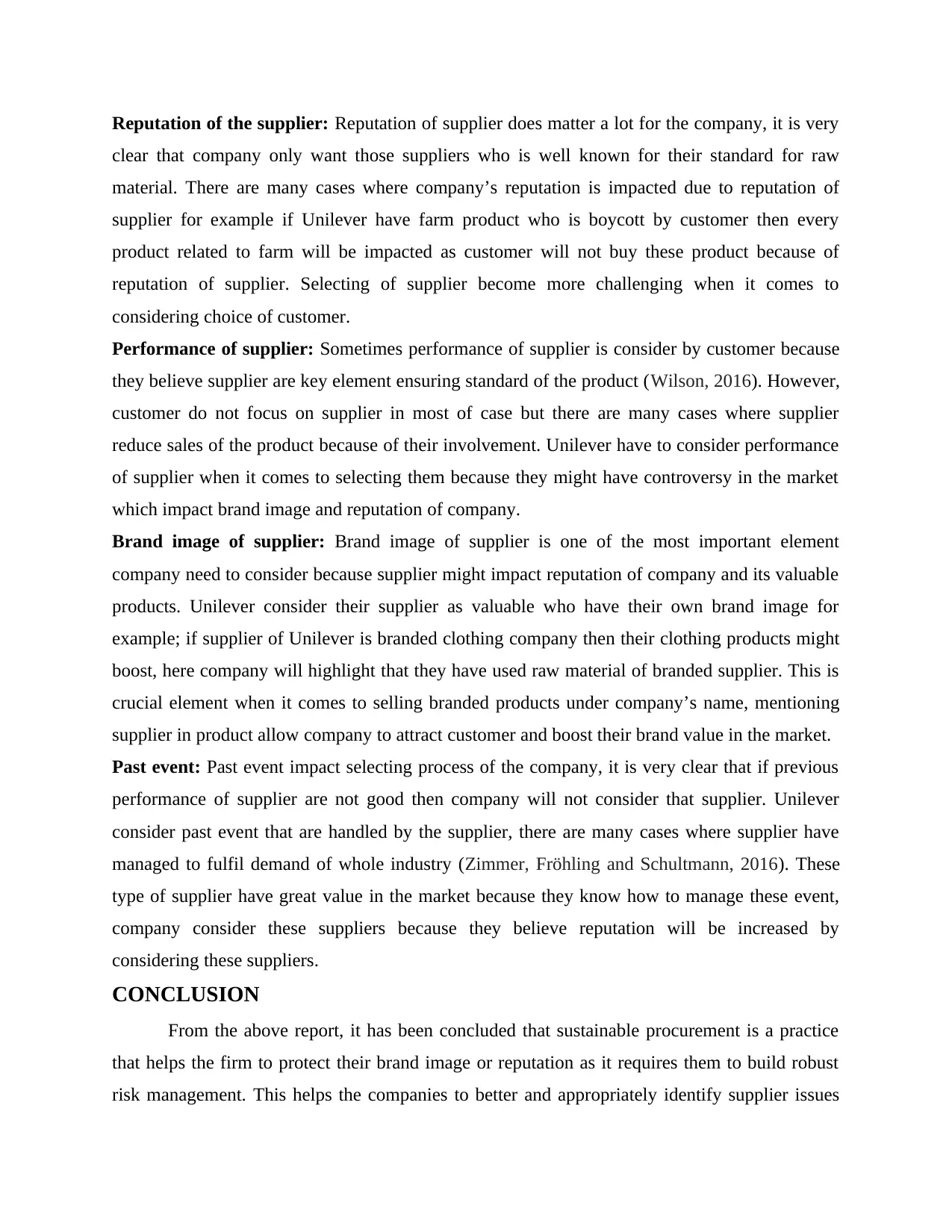
Reputation of the supplier: Reputation of supplier does matter a lot for the company, it is very
clear that company only want those suppliers who is well known for their standard for raw
material. There are many cases where company’s reputation is impacted due to reputation of
supplier for example if Unilever have farm product who is boycott by customer then every
product related to farm will be impacted as customer will not buy these product because of
reputation of supplier. Selecting of supplier become more challenging when it comes to
considering choice of customer.
Performance of supplier: Sometimes performance of supplier is consider by customer because
they believe supplier are key element ensuring standard of the product (Wilson, 2016). However,
customer do not focus on supplier in most of case but there are many cases where supplier
reduce sales of the product because of their involvement. Unilever have to consider performance
of supplier when it comes to selecting them because they might have controversy in the market
which impact brand image and reputation of company.
Brand image of supplier: Brand image of supplier is one of the most important element
company need to consider because supplier might impact reputation of company and its valuable
products. Unilever consider their supplier as valuable who have their own brand image for
example; if supplier of Unilever is branded clothing company then their clothing products might
boost, here company will highlight that they have used raw material of branded supplier. This is
crucial element when it comes to selling branded products under company’s name, mentioning
supplier in product allow company to attract customer and boost their brand value in the market.
Past event: Past event impact selecting process of the company, it is very clear that if previous
performance of supplier are not good then company will not consider that supplier. Unilever
consider past event that are handled by the supplier, there are many cases where supplier have
managed to fulfil demand of whole industry (Zimmer, Fröhling and Schultmann, 2016). These
type of supplier have great value in the market because they know how to manage these event,
company consider these suppliers because they believe reputation will be increased by
considering these suppliers.
CONCLUSION
From the above report, it has been concluded that sustainable procurement is a practice
that helps the firm to protect their brand image or reputation as it requires them to build robust
risk management. This helps the companies to better and appropriately identify supplier issues
clear that company only want those suppliers who is well known for their standard for raw
material. There are many cases where company’s reputation is impacted due to reputation of
supplier for example if Unilever have farm product who is boycott by customer then every
product related to farm will be impacted as customer will not buy these product because of
reputation of supplier. Selecting of supplier become more challenging when it comes to
considering choice of customer.
Performance of supplier: Sometimes performance of supplier is consider by customer because
they believe supplier are key element ensuring standard of the product (Wilson, 2016). However,
customer do not focus on supplier in most of case but there are many cases where supplier
reduce sales of the product because of their involvement. Unilever have to consider performance
of supplier when it comes to selecting them because they might have controversy in the market
which impact brand image and reputation of company.
Brand image of supplier: Brand image of supplier is one of the most important element
company need to consider because supplier might impact reputation of company and its valuable
products. Unilever consider their supplier as valuable who have their own brand image for
example; if supplier of Unilever is branded clothing company then their clothing products might
boost, here company will highlight that they have used raw material of branded supplier. This is
crucial element when it comes to selling branded products under company’s name, mentioning
supplier in product allow company to attract customer and boost their brand value in the market.
Past event: Past event impact selecting process of the company, it is very clear that if previous
performance of supplier are not good then company will not consider that supplier. Unilever
consider past event that are handled by the supplier, there are many cases where supplier have
managed to fulfil demand of whole industry (Zimmer, Fröhling and Schultmann, 2016). These
type of supplier have great value in the market because they know how to manage these event,
company consider these suppliers because they believe reputation will be increased by
considering these suppliers.
CONCLUSION
From the above report, it has been concluded that sustainable procurement is a practice
that helps the firm to protect their brand image or reputation as it requires them to build robust
risk management. This helps the companies to better and appropriately identify supplier issues
⊘ This is a preview!⊘
Do you want full access?
Subscribe today to unlock all pages.

Trusted by 1+ million students worldwide
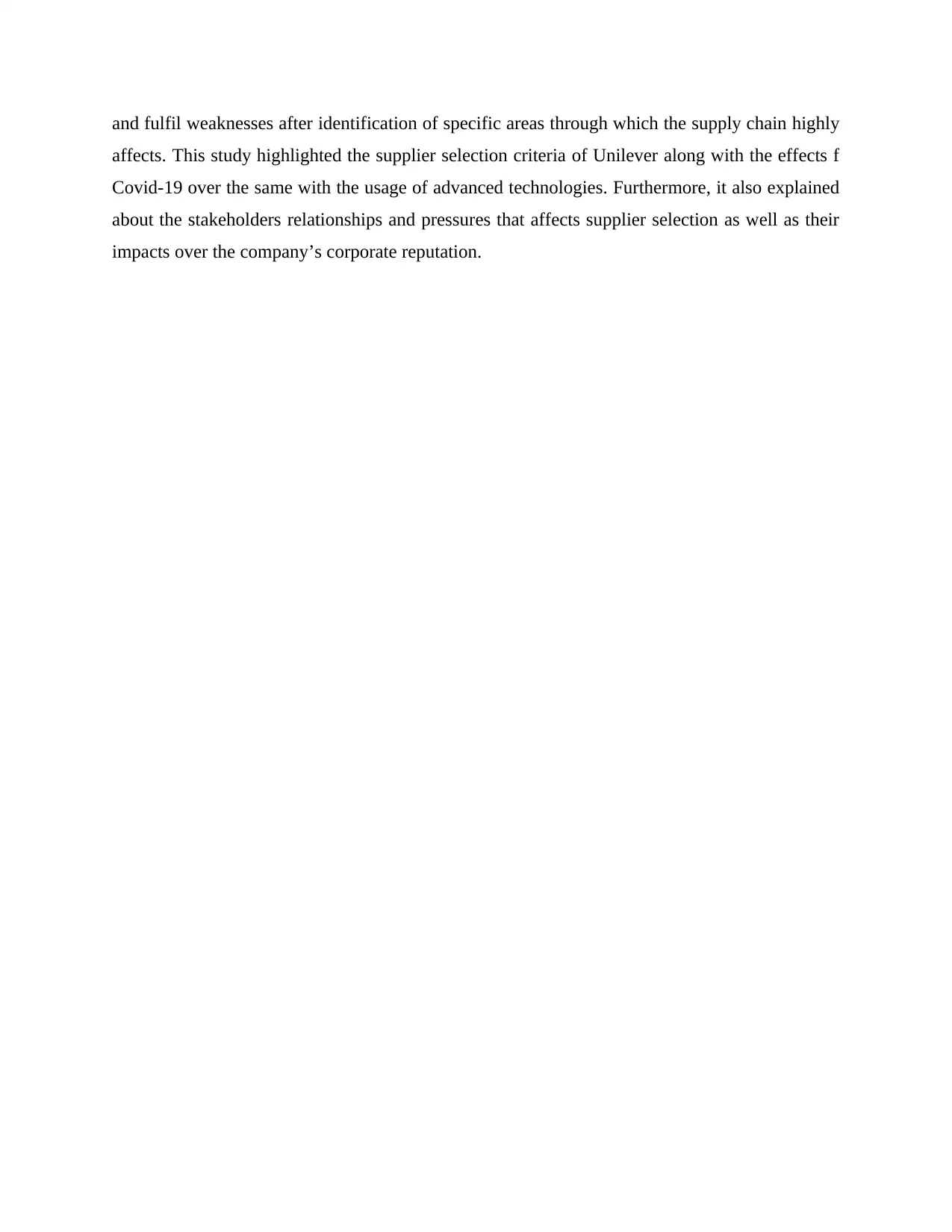
and fulfil weaknesses after identification of specific areas through which the supply chain highly
affects. This study highlighted the supplier selection criteria of Unilever along with the effects f
Covid-19 over the same with the usage of advanced technologies. Furthermore, it also explained
about the stakeholders relationships and pressures that affects supplier selection as well as their
impacts over the company’s corporate reputation.
affects. This study highlighted the supplier selection criteria of Unilever along with the effects f
Covid-19 over the same with the usage of advanced technologies. Furthermore, it also explained
about the stakeholders relationships and pressures that affects supplier selection as well as their
impacts over the company’s corporate reputation.
Paraphrase This Document
Need a fresh take? Get an instant paraphrase of this document with our AI Paraphraser
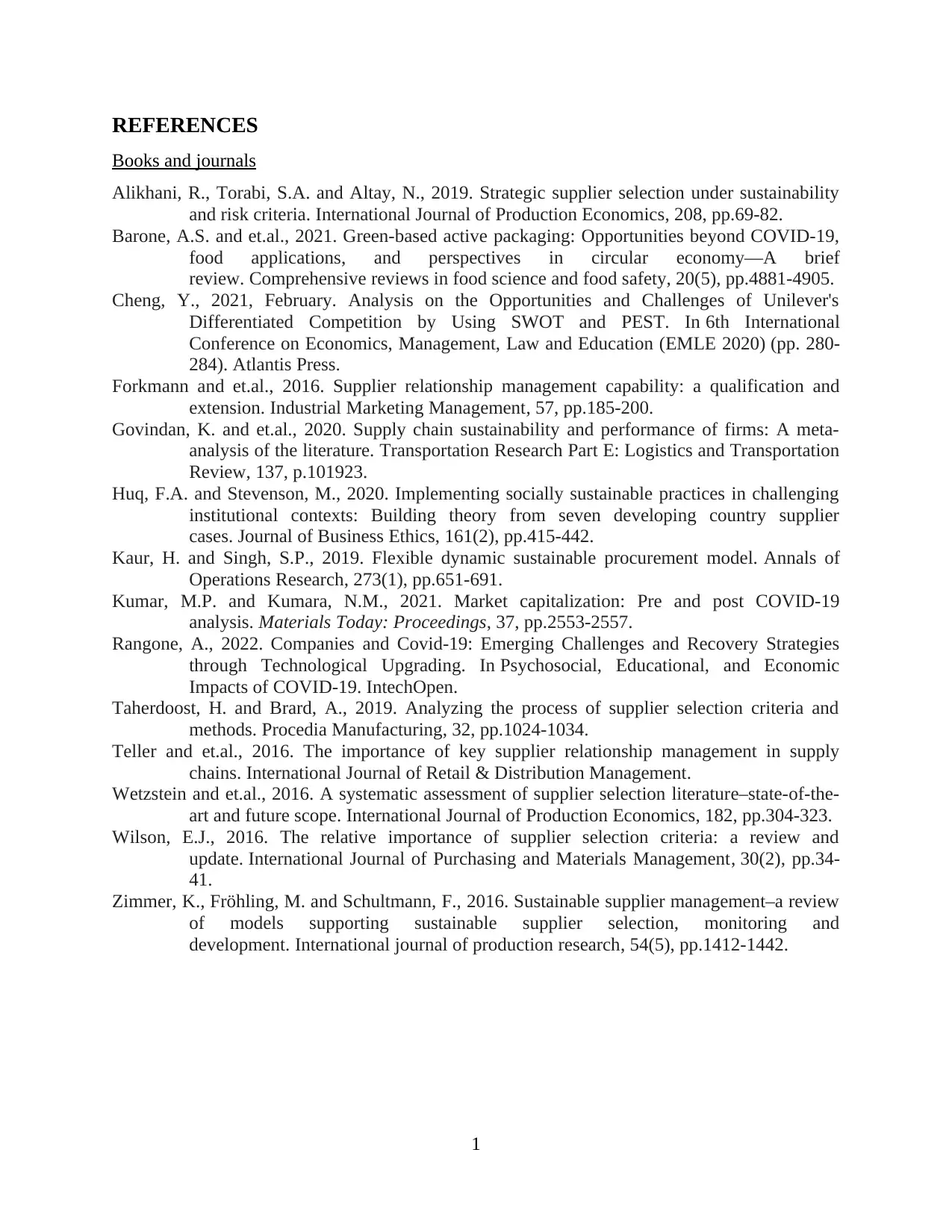
REFERENCES
Books and journals
Alikhani, R., Torabi, S.A. and Altay, N., 2019. Strategic supplier selection under sustainability
and risk criteria. International Journal of Production Economics, 208, pp.69-82.
Barone, A.S. and et.al., 2021. Green‐based active packaging: Opportunities beyond COVID‐19,
food applications, and perspectives in circular economy—A brief
review. Comprehensive reviews in food science and food safety, 20(5), pp.4881-4905.
Cheng, Y., 2021, February. Analysis on the Opportunities and Challenges of Unilever's
Differentiated Competition by Using SWOT and PEST. In 6th International
Conference on Economics, Management, Law and Education (EMLE 2020) (pp. 280-
284). Atlantis Press.
Forkmann and et.al., 2016. Supplier relationship management capability: a qualification and
extension. Industrial Marketing Management, 57, pp.185-200.
Govindan, K. and et.al., 2020. Supply chain sustainability and performance of firms: A meta-
analysis of the literature. Transportation Research Part E: Logistics and Transportation
Review, 137, p.101923.
Huq, F.A. and Stevenson, M., 2020. Implementing socially sustainable practices in challenging
institutional contexts: Building theory from seven developing country supplier
cases. Journal of Business Ethics, 161(2), pp.415-442.
Kaur, H. and Singh, S.P., 2019. Flexible dynamic sustainable procurement model. Annals of
Operations Research, 273(1), pp.651-691.
Kumar, M.P. and Kumara, N.M., 2021. Market capitalization: Pre and post COVID-19
analysis. Materials Today: Proceedings, 37, pp.2553-2557.
Rangone, A., 2022. Companies and Covid-19: Emerging Challenges and Recovery Strategies
through Technological Upgrading. In Psychosocial, Educational, and Economic
Impacts of COVID-19. IntechOpen.
Taherdoost, H. and Brard, A., 2019. Analyzing the process of supplier selection criteria and
methods. Procedia Manufacturing, 32, pp.1024-1034.
Teller and et.al., 2016. The importance of key supplier relationship management in supply
chains. International Journal of Retail & Distribution Management.
Wetzstein and et.al., 2016. A systematic assessment of supplier selection literature–state-of-the-
art and future scope. International Journal of Production Economics, 182, pp.304-323.
Wilson, E.J., 2016. The relative importance of supplier selection criteria: a review and
update. International Journal of Purchasing and Materials Management, 30(2), pp.34-
41.
Zimmer, K., Fröhling, M. and Schultmann, F., 2016. Sustainable supplier management–a review
of models supporting sustainable supplier selection, monitoring and
development. International journal of production research, 54(5), pp.1412-1442.
1
Books and journals
Alikhani, R., Torabi, S.A. and Altay, N., 2019. Strategic supplier selection under sustainability
and risk criteria. International Journal of Production Economics, 208, pp.69-82.
Barone, A.S. and et.al., 2021. Green‐based active packaging: Opportunities beyond COVID‐19,
food applications, and perspectives in circular economy—A brief
review. Comprehensive reviews in food science and food safety, 20(5), pp.4881-4905.
Cheng, Y., 2021, February. Analysis on the Opportunities and Challenges of Unilever's
Differentiated Competition by Using SWOT and PEST. In 6th International
Conference on Economics, Management, Law and Education (EMLE 2020) (pp. 280-
284). Atlantis Press.
Forkmann and et.al., 2016. Supplier relationship management capability: a qualification and
extension. Industrial Marketing Management, 57, pp.185-200.
Govindan, K. and et.al., 2020. Supply chain sustainability and performance of firms: A meta-
analysis of the literature. Transportation Research Part E: Logistics and Transportation
Review, 137, p.101923.
Huq, F.A. and Stevenson, M., 2020. Implementing socially sustainable practices in challenging
institutional contexts: Building theory from seven developing country supplier
cases. Journal of Business Ethics, 161(2), pp.415-442.
Kaur, H. and Singh, S.P., 2019. Flexible dynamic sustainable procurement model. Annals of
Operations Research, 273(1), pp.651-691.
Kumar, M.P. and Kumara, N.M., 2021. Market capitalization: Pre and post COVID-19
analysis. Materials Today: Proceedings, 37, pp.2553-2557.
Rangone, A., 2022. Companies and Covid-19: Emerging Challenges and Recovery Strategies
through Technological Upgrading. In Psychosocial, Educational, and Economic
Impacts of COVID-19. IntechOpen.
Taherdoost, H. and Brard, A., 2019. Analyzing the process of supplier selection criteria and
methods. Procedia Manufacturing, 32, pp.1024-1034.
Teller and et.al., 2016. The importance of key supplier relationship management in supply
chains. International Journal of Retail & Distribution Management.
Wetzstein and et.al., 2016. A systematic assessment of supplier selection literature–state-of-the-
art and future scope. International Journal of Production Economics, 182, pp.304-323.
Wilson, E.J., 2016. The relative importance of supplier selection criteria: a review and
update. International Journal of Purchasing and Materials Management, 30(2), pp.34-
41.
Zimmer, K., Fröhling, M. and Schultmann, F., 2016. Sustainable supplier management–a review
of models supporting sustainable supplier selection, monitoring and
development. International journal of production research, 54(5), pp.1412-1442.
1

2
⊘ This is a preview!⊘
Do you want full access?
Subscribe today to unlock all pages.

Trusted by 1+ million students worldwide
1 out of 12
Related Documents
Your All-in-One AI-Powered Toolkit for Academic Success.
+13062052269
info@desklib.com
Available 24*7 on WhatsApp / Email
![[object Object]](/_next/static/media/star-bottom.7253800d.svg)
Unlock your academic potential
Copyright © 2020–2026 A2Z Services. All Rights Reserved. Developed and managed by ZUCOL.





